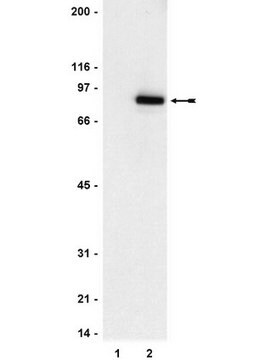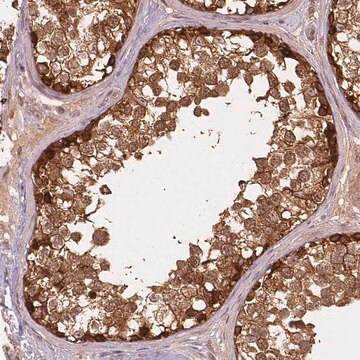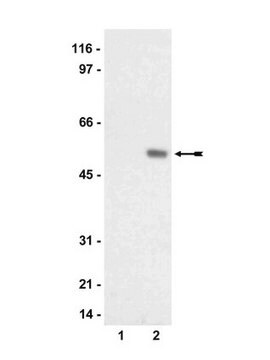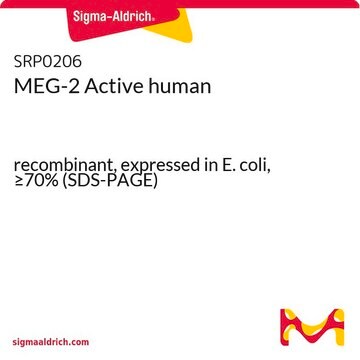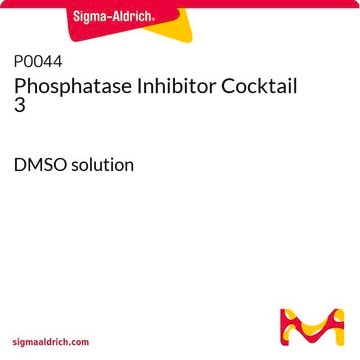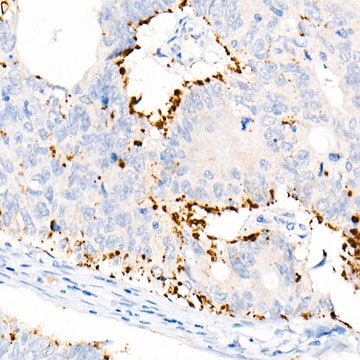SRP0217
SHP-2 Active human
recombinant, expressed in E. coli, ≥90% (SDS-PAGE)
Synonym(s):
Noonan syndrome 1, PTP-1D, PTP2C, PTPN11, SHP2
Sign Into View Organizational & Contract Pricing
All Photos(1)
About This Item
UNSPSC Code:
12352200
NACRES:
NA.32
Recommended Products
biological source
human
recombinant
expressed in E. coli
Assay
≥90% (SDS-PAGE)
form
aqueous solution
mol wt
59.5 kDa
packaging
pkg of 20 μg
storage condition
avoid repeated freeze/thaw cycles
concentration
0.73 mg/mL
NCBI accession no.
UniProt accession no.
shipped in
dry ice
storage temp.
−70°C
Gene Information
human ... PTPN11(5781)
General description
Protein tyrosine phosphatase, non-receptor type 11 (PTPN11), also known as SHP-2, is a scaffolding protein. It possesses two SH2 domains at the amino terminal, a protein tyrosine phosphatase domain and carboxy-terminal region. The gene encoding SHP-2 is localized on human chromosome 12q24.13.
Application
Useful for the study of enzyme kinetics, regulation, to dephosphorylate target substrates and for screening inhibitors.
Human active SHP-2 has been used to study the effects of α-lipoic acid and dihydrolipoic acid on the activity of SHP-2 enzyme.
Human active SHP-2 has been used to study the effects of α-lipoic acid and dihydrolipoic acid on the activity of SHP-2 enzyme.
Biochem/physiol Actions
Protein tyrosine phosphatase, non-receptor type 11 (PTPN11) or SHP-2 is involved in signal transduction pathways downstream of growth receptors. It acts as a proto-oncogene. SHP-2 leads to sustained RAS activation by dephosphorylating the RAS-GTPase-activating protein binding site on Grb2-associated binder 1 (Gab1). This protein also nucleates multiple signaling proteins and thus, acts as an adaptor protein. Mutations in the SHP-2 gene have been associated with Noonan syndrome.
Unit Definition
One unit will hydrolyze 1 nmol p-nitrophenyl phosphate per minute at pH 7.4 and 30°C.
Physical form
Formulated in 25 mM Tris-HCl, pH 8.0, 75 mM NaCl, 0.05% Tween-20, 50% glycerol, 2 mM EDTA, 1 mM DTT, and 10 mM glutathione.
Preparation Note
Thaw on ice. Upon first thaw, briefly spin tube containing enzyme to recover full content of the tube. Aliquot enzyme into single use aliquots. Store remaining undiluted enzyme in aliquots at -70°C. Note: Enzyme is very sensitive to freeze/thaw cycles.
Other Notes
Amino acids : 224-529
Storage Class Code
10 - Combustible liquids
WGK
WGK 1
Flash Point(F)
Not applicable
Flash Point(C)
Not applicable
Certificates of Analysis (COA)
Search for Certificates of Analysis (COA) by entering the products Lot/Batch Number. Lot and Batch Numbers can be found on a product’s label following the words ‘Lot’ or ‘Batch’.
Already Own This Product?
Find documentation for the products that you have recently purchased in the Document Library.
Lipoic Acid Decreases the Viability of Breast Cancer Cells and Activity of PTP1B and SHP2
Anticancer Research, 37(6) (2017)
Genomic Duplication of PTPN11 is an Uncommon Cause of Noonan Syndrome
John M
American Journal of Medical Genetics. Part A (2009)
SHP2 is induced by the HBx-NF-?B pathway and contributes to fibrosis during human early hepatocellular carcinoma development.
Kang HJ
Oncotarget, 8(16) (2017)
Naphak Modhiran et al.
Science translational medicine, 7(304), 304ra142-304ra142 (2015-09-12)
Complications arising from dengue virus infection include potentially fatal vascular leak, and severe disease has been linked with excessive immune cell activation. An understanding of the triggers of this activation is critical for the development of appropriately targeted disease control
Hotspots in PTPN11 Gene Among Indian Children With Noonan Syndrome.
Narayanan DL
Indian Pediatrics, 54(8), 638-643 (2017)
Our team of scientists has experience in all areas of research including Life Science, Material Science, Chemical Synthesis, Chromatography, Analytical and many others.
Contact Technical Service